|
|
|
Sort Order |
|
|
|
Items / Page
|
|
|
|
|
|
|
| Srl | Item |
| 1 |
ID:
121080
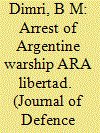

|
|
|
|
|
| Publication |
2013.
|
| Summary/Abstract |
The ARA Libertad Case (Argentina v. Ghana) is the first instance where the International Tribunal for the Law of the Sea (ITLOS), Hamburg, Germany considered the issue of the release of a warship which was detained in a foreign port contrary to the principles of sovereign immunity of warships. The Argentinian warship was detained based on a commercial case filed by an American hedge fund against Argentina in the Ghanaian Court. According to the Court, Argentina had waived sovereign immunity in respect of the claims of the bondholders and, therefore, the warship could be arrested for execution of a monetary claim. This article examines the ITLOS order at the backdrop of warship rights and duties under the International Law of the Sea.
|
|
|
|
|
|
|
|
|
|
|
|
|
|
|
|
| 2 |
ID:
121082
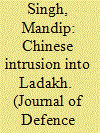

|
|
|
|
|
| Publication |
2013.
|
| Summary/Abstract |
The intrusion by the Chinese Army in the Ladakh sector of the Line of Actual Control (LAC) was first reported by the media on 15 April 2013. Initial reports indicated that about 30-40 armed soldiers of the Chinese Army had set up three to four tents in the area of Depsang Bulge, south east of Daulat Beg Oldi (DBO). Subsequently, media reports indicated that the Government had accepted this intrusion to be 19 km from the LAC, inside Indian territory. The Depsang Bulge is east of the River Shyok and close to DBO, an old forward airfield, recently activated as part of the infrastructure development plan of the Indian armed forces in the Ladakh sector. The intrusion became significant because it was the first time that a transgressing patrol had set up camp and indicated its will to continue to stay put and proclaim, by way of banners, the area to be Chinese territory.
|
|
|
|
|
|
|
|
|
|
|
|
|
|
|
|
| 3 |
ID:
121086
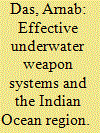

|
|
|
|
|
| Publication |
2013.
|
| Summary/Abstract |
The Indian Ocean Region (IOR) has profound strategic relevance not only for the nations in the region but also for other countries.1 The bulk of the world's merchant fleets transit through one of the busiest sea lanes in the world, via the Malacca Straits. Also, the presence of major petroleum exports originating from the Gulf, encourage the major powers of the world to have a strategic presence in the IOR. Present day naval strategies are not so much about exercising sea denial but about maintaining strategic presence, and switching to sea control whenever there is any threat to their own maritime interests. This calls for comprehensive situational awareness, and the continuous monitoring of both the surface and underwater fronts. The geographical location of India leaves it no choice but to be a major player in the IOR. Further, due to the growing energy needs of China in the recent past, and the bulk of its energy supplies transiting through the IOR, has encouraged both China and the United States to ensure their own strategic presence.
|
|
|
|
|
|
|
|
|
|
|
|
|
|
|
|
| 4 |
ID:
121075


|
|
|
|
|
| Publication |
2013.
|
| Summary/Abstract |
A closed loop feedback system for ensuring the quality of the Army equipment exists. Notwithstanding this, a number of Army equipment show a high failure rate at crucial times and are, therefore, a matter of great concern. These failed equipment have resulted in a number of avoidable casualties as well as restricted operational planning by tactical commanders in the field due to the non-availability of equipment for deployment, which results from their low reliability or high rates of failure. This article examines how this system has been exploited in terms of analysing the feedback from the field Army and using the outcomes of these analyses for incorporating improvements in General Staff Qualitative Requirements (GSQRs), Acceptance Test Procedures (ATPs), Quality Assurance Plans (QAPs), etc., all to ensure that a better quality product is procured. Based on the analysis, it also provides certain recommendations to improve the existing system.
|
|
|
|
|
|
|
|
|
|
|
|
|
|
|
|
| 5 |
ID:
121076


|
|
|
|
|
| Publication |
2013.
|
| Summary/Abstract |
This article analyses the alteration of the referent object for maritime security from protection of shipping and port facilities to protection of citizens and national economies. It presents a tentative answer on the extent and consequences of this alteration applied by states in a global perspective, and focuses on validating four explanatory factors on why the alteration has occurred. The time period of study is between 1991 and 2013. Its results illustrate a transition in states' security policies from traditional expressions of maritime security to broader security perspectives, and also indicates radically altered maritime strategic perspectives among states.
|
|
|
|
|
|
|
|
|
|
|
|
|
|
|
|
| 6 |
ID:
121084
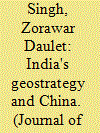

|
|
|
|
|
| Publication |
2013.
|
| Summary/Abstract |
Two recent events exemplify India's geopolitical dilemma. In early April 2013, it was reported that Chinese submarines had been conducting forays in the Indian Ocean that were apparently picked up by US Navy sonar.1 A few weeks later, there was a Chinese intrusion in the western sector where a platoon of Chinese troops entered the Depsang Valley area of eastern Ladakh.2 While the status quo ante was peacefully attained, the Ladakh incident is a vivid reminder of the abiding implications of an unresolved Himalayan dispute. Collectively, what both these events also evoke is a deeper contestation in India's geostrategy vis-à-vis China. India's geostrategy is being contested by Mackinder and Mahanian images, and some of India's strategic ambivalence can be traced to the lack of a welldefined geopolitical image to ground this debate.
|
|
|
|
|
|
|
|
|
|
|
|
|
|
|
|
| 7 |
ID:
121085
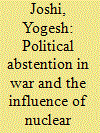

|
|
|
|
|
| Publication |
2013.
|
| Summary/Abstract |
Clemenceau's famous statement-'War is too important to be left to the generals'-represents an essential conflict in civil-military relations during crisis situations, especially with regard to the demarcation of boundaries for civil and military authority in the conduct of war. Where and when, in the conduct of war, should the political class step down and military commanders take over? Or, since, as the Clausewitzian dictum of war being a continuation of politics suggests, can war ever be considered a purely military enterprise? With the advent of nuclear weapons, these questions have become immensely important since military exigencies can now have extreme political ramifications.
|
|
|
|
|
|
|
|
|
|
|
|
|
|
|
|
| 8 |
ID:
121074


|
|
|
|
|
| Publication |
2013.
|
| Summary/Abstract |
Over the past decade, defence capital acquisition reforms have enhanced standardization, transparency and bigger acquisition budgets. Yet the system grapples with delays, cost escalations and gaps in operational preparedness. This article explores the structure, process and cultural dimensions of the acquisition system, unpacking the underlying linkages between policy, planning, budgeting, strategic direction, and outcomefocused analytical decision-making-factors that influence effectiveness of the procurement system. The author makes a comparative study of the defence acquisition system of six countries, learning from the reforms and relentless pursuit of efficiency and effectiveness in USA, UK and France and the evolving systems of Australia, Brazil and Canada. The article seeks to steer the reforms debate beyond procurement procedures to performance management, strategic planning and risk management, towards delivering a culture of professionalism, innovation and outcomefocused decision-making to establish an acquisition system that best suits India's defence needs.
|
|
|
|
|
|
|
|
|
|
|
|
|
|
|
|
| 9 |
ID:
121078


|
|
|
|
|
| Publication |
2013.
|
| Summary/Abstract |
The debate surrounding the stability of nuclear weapons has been a critical issue for the last half century. On the one hand, realists like Kenneth Waltz argue that the proliferation of nuclear weapons will foster greater stability due to the intrinsic deterrent logic associated with these weapons. The nuclear pessimists, on the other hand, argue that the accidental use of nuclear weapons and unstable regime types are a greater concern for the outbreak of nuclear war. With no clear consensus in sight, this article argues that the nuclear deterrent logic is the most compelling explanation for the lack of full-scale war. It takes as its case study the 1999 Indo- Pakistani conflict at Dras-Kargil. This crucial case study demonstrates that the caution and, therefore, deterrent effects associated with nuclear weapons in the Indo-Pakistan rivalry confirms that caution and stability result from the introduction of these weapons on the Sub-continent.
|
|
|
|
|
|
|
|
|
|
|
|
|
|
|
|
|
|
|
|
|